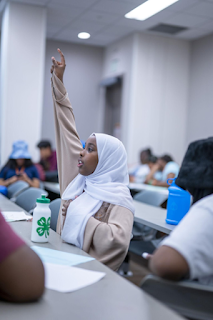Since the pandemic, the headlines shifted a bit, now focusing on precipitously dropping enrollment rates. And while overall rates are slowly creeping back up, the enrollment of Black, Native and Hispanic students has continued to decline.
These pre and post pandemic trends stratified by race suggest something different than a lack of readiness. They point to deeply systemic and social constraints that shape youths' sets of opportunities to achieve educational and career goals.
This means that creating opportunities for young people to achieve career and postsecondary aspirations requires more than helping them "get ready" with skills and knowledge. It requires changing the social structures and systems in which a young person lives and interacts.
But how can a positive youth development approach effect systems change? So often, youth programs are designed to help young people gain important skills (academic, vocational, 21st century) which are valuable at an individual level, but leave unjust systems unchallenged. Here are three youth development strategies that research suggests can effectively support youths’ college and career pathways by reorienting practice and systems to harness youth assets.
- Create the conditions for youth to voice their lived experiences and be heard. Young people need opportunities to voice their vulnerabilities and hopes, and have them recognized as valid and valuable. Martinez-Vargas et al (2020) suggests that this, among many things, fosters a sense of solidarity and support among peers, strengthening their agency to achieve their postsecondary and career goals.
- Foster "dream-affirming" environments. Gibbs Grey’s (2018) research points to how environments and adults that affirm youths' aspirations effectively counter the deficit-based stereotypes of youth of color that constrain their college and career possibilities.
- Hold opportunities for young people to interact with community members, postsecondary professionals, or industry leaders. One might argue that this happens all the time. However, as DeJaeghere (2021) suggests, these opportunities are often designed with the purpose of connecting young people to others who can teach them new skills or introduce them to new opportunities. What research suggests is more effective, is that these adults will now have opportunities to see and value youth assets.
Positive youth development approaches to address disparities in college and career attainment should not solely focus on making sure youth are "ready" by helping them acquire what they are perceived to be lacking. Instead, strategies should include creating opportunities for peers and adults to recognize youths’ infinite future possibilities so that there can be a strengthened collective effort to create more inclusive systems and practices.

This article was very insightful and validating. I am all the way in South Africa and we experience the same challenges when it comes to young people "not being prepared" But when you take a closer look, the young people from disadvantaged backgrounds are usually the ones who are "under prepared" forgetting that they are constantly being excluded in growth opportunities - systematically.
ReplyDeleteThank you for this article that articulate what needs to be done to bring the young people on board as afar as college and career is concerned. Iam a positive youth development practitioner based in Kenya. I particular liked asset number 1 above that acknowledges that young people have a lived experience that need s to be brought to life as they make career choices not just academic qualification. ''Most young people rely on the skills they have spontaneously developed through the practice of their personal interests to earn a living''
ReplyDelete